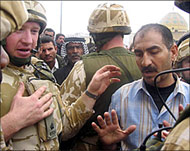Iraq may get US-picked defence minister
The Iraqi newspaper Al Sabaah has reported that the US occupation authorities in Iraq are about to nominate an Iraqi minister of defence in coordination with the Iraqi Governing Council (IGC).

Field brigadier-general Abd al-Qadir al-Mafraji, a senior officer in the former Iraqi army told the newspaper that the conditions and requirements for nominating the minister and the staff personnel had been finalised.
“Senior officials in the future ministry of defence must meet certain requirements” he said “the most important is that the nominee should be a former military attaché in the US or UK.”
“All Iraqi army officers who received military training in Russia and the former Soviet Union are excluded” he said.
Iraqi sources have confirmed to Aljazeera.net that media reports which suggested a Kurdish figure is to be installed as the minister of defence are true.
Secret training
Meanwhile, the United States is secretly training several senior former Iraqi army officers to advise Iraq’s intended military establishment, former Iraqi officers and a politician said on Sunday.
US army spokesman Brigadier General Mark Kimmitt said he
had “no information” about such a training programme.
The politician, who refused to be named, said six major-generals and 11 other senior officers active in the Iraqi army until last year’s US-led invasion to topple Saddam Hussein were being trained, mostly in the United States.
Brigadier-general Najib al-Salhi, who defected to Washington in the 1990s and is now back in Iraq, said several officers were being trained abroad, but said they were all from the regular army, not from the elite Republican Guard units.
 |
|
Soldiers from the dissolved Iraqi |
“These were among the best apolitical elements in the Iraqi army,” he said “They are not all Sunni Muslims as some allege. They represent a sectarian balance.”
Salhi, and another Iraqi officer who has also advised US occupation authorities in Iraq on rebuilding security forces, said experienced officers training abroad were expected to act as advisers to new service chiefs and a new defence ministry.
Uncalculated move
US administrator Paul Bremer disbanded Iraq’s 400,000-strong armed forces and security agencies in May, when he also dissolved the defence and information ministries.
That decision was widely criticised as creating a pool of anti-occupation armed, angry and jobless men.
The politician, who showed Reuters a list of officers he said were being trained by the United States, said the Iraqi Governing Council had not been consulted on the programme.
“Iraqi security forces have to win the consent of the people,” he said. “Hiring these officers violates an understanding between the Governing Council and America that senior officials in the former regime would not play a role in the new Iraq.”
But former army officers said they saw no political threat from the men now reportedly being groomed by the United States.
Brigadier Abu Nawar, another former officer, said the regular army had been a professional force, compared to the elite units and multiple security agencies during Saddam Hussein’s rule.
“These officers graduated before Saddam even came to power and had a reputation as excellent professionals. They were outside Saddam’s circle and (Baath party) political commissars watched their moves,” he said.
Identity
US forces are training officer cadets in Jordan for the new Iraqi army, due to number 30,000 by September, and the first batch graduated last week. The cadets include junior officers in the former Iraqi army and Kurdish “peshmerga” militiamen who once fought Saddam’s forces.
Iraqi army officers are resentful towards the training of officers outside Iraq, and believe that their army has enough knowledge and skills to train its own officers.
Ayad al-Janabi, an Iraqi warplane pilot said an officer should receive his/her elementary training at home.
“Receiving the basic training at home, guarantees the national identity of the officer” he said “after that an officer can receive further training abroad.”